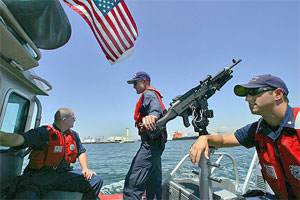Foreign Adventures Force Drug War Cuts
The Pentagon has traditionally played a major role in monitoring U.S. borders and assisting the Coast Guard in intercepting drug shipments, but the burden of Iraq has forced the military to scale back its efforts, opening holes for drug smugglers to exploit.
The Pentagon has traditionally played a major role in monitoring U.S. borders and assisting the Coast Guard in intercepting drug shipments, but the burden of Iraq has forced the military to scale back its efforts, opening holes for drug smugglers to exploit.
Your support matters…Los Angeles Times
Internal records show that in the last four years the Pentagon has reduced by more than 62% its surveillance flight-hours over Caribbean and Pacific Ocean routes that are used to smuggle cocaine, marijuana and, increasingly, Colombian-produced heroin. At the same time, the Navy is deploying one-third fewer patrol boats in search of smugglers.
The Defense Department also plans to withdraw as many as 10 Black Hawk helicopters that have been used by a multi-agency task force to move quickly to make drug seizures and arrests in the Caribbean, a major hub for drugs heading to the United States.
And the military has deactivated many of the high-tech surveillance “aerostats,” or radar balloons, that once guarded the entire southern border, saying it lacks the funds to restore and maintain them.
The Department of Defense defended its policy shift in a budget document sent to Congress in October: “The DOD position is that detecting drug trafficking is a lower priority than supporting our service members on ongoing combat missions.”
Members of Congress and drug-control officials have said the Pentagon’s cuts and redeployments have hamstrung the U.S. drug interdiction effort at a time when an estimated 1,000 metric tons of inexpensive, high-quality cocaine is entering the country each year.
Independent journalism is under threat and overshadowed by heavily funded mainstream media.
You can help level the playing field. Become a member.
Your tax-deductible contribution keeps us digging beneath the headlines to give you thought-provoking, investigative reporting and analysis that unearths what's really happening- without compromise.
Give today to support our courageous, independent journalists.









You need to be a supporter to comment.
There are currently no responses to this article.
Be the first to respond.